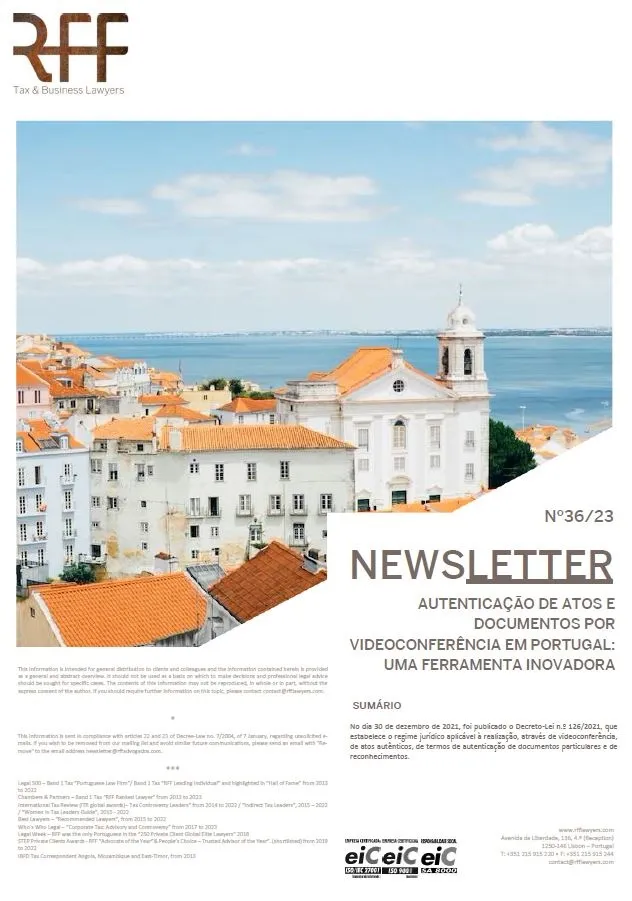Authentication of private acts through video-conference in Portugal: an innovative tool

Authentication of private acts through video-conference in Portugal: an innovative tool
SUMMARY
On December 30th, 2021, Decree-Law no. 126/2021 was published, establishing the legal regime applicable to the performance, through videoconference, of authentic acts, of terms of authentication of private documents, and of acknowledgements.
INTRODUCTION
Decree-Law no. 126/2021 (hereinafter, the "Decree") was approved on December 30th, 2021, establishing the legal regime applicable to the performance, through videoconferencing, of authentic acts, authentication of private documents, and witnessing of signatures.
TEMPORARY AND OPTIONAL NATURE
The Decree was created and published in order to overcome difficulties experienced during the COVID 19 pandemic.
For this reason, the legal regime in question was endowed with a temporary nature, having thus been stipulated for it, initially, a period of 2 years, counting from April 4th, 2022.
However, as stated in the preamble to the Decree, the Government will consider the possibility of definitively consolidating the mechanism in the Portuguese legal system and may therefore suggest an extension of its period of validity.
The optional nature of the mechanism should also be emphasized, and thus the possibility of the professionals qualified for this purpose continuing to carry out the acts in question in person should not be ruled out.
The above being said, whether the acts are performed in person or by videoconference, their evidentiary value is the same.
PROFESSIONALS QUALIFIED TO PERFORM ACTS BY VIDEOCONFERENCE
The following professionals are covered by the Decree and, therefore, qualified to perform acts by videoconference:
a) registrars;
b) registry officers;
c) notaries;
d) Portuguese consular agentes;
e) lawyers; and
f) solicitors.
Nevertheless, there is a distinction between the acts that may be performed by each of the professionals in question.
Registrars and registry officers may perform acts by videoconference in the scope of:
g) special procedures for the transmission, encumbrance and immediate registration of buildings in a single face-to-face meeting;
g) procedures of separation or divorce by mutual consent; and
f) procedures of habilitation of heirs with or without registration.
Notaries, Portuguese consular agents, lawyers, and solicitors may use videoconferencing to perform all acts within their jurisdiction, with the exception of the following:
a) wills and acts relating thereto;
b) acts relating to facts subject to land registration which do not concern legal facts involving the constitution, recognition, acquisition, modification or termination of rights of ownership, usufruct, use and habitation, surface or easement, as well as horizontal property, the promise of sale or encumbrance (with real effectiveness) of real property or the assignment of the contractual position resulting from this fact; and
c) assignments, modifications, extinction of mortgages and assignments of the respective priority registration grade and consignations of income.
TERRITORIAL SCOPE
The acts to be performed by registrars, registry officers, notaries, lawyers and solicitors, may only be performed by videoconference when they are performed in national territory.
Portuguese consular agents, on the other hand, may perform, by videoconference, acts concerning Portuguese nationals who are abroad or which are to produce their effects in Portugal.
MEANS MADE AVAILABLE FOR THE PRACTICE OF THE ACTS
The Ministry of Justice has made available on the website www.justiça.gov.pt an electronic platform for the performance of acts at a distance.
Through this electronic platform, which is jointly managed by the Institute of Registration and Notary Affairs (IRN) and the Institute of Financial Management and Equipment of Justice (IGFEJ), it is possible to access the videoconference sessions, through which remote acts may be performed.
When videoconferencing sessions are held, the interveners may be accompanied, also by videoconference or in person, by a lawyer or solicitor, provided that the respective reference is made in the documents drawn up.
The electronic platform provides reserved areas, and access to these areas is made by authenticating the user using the means available on the autenticação.gov.pt website, such as the Citizen's Card, Mobile Digital Key, or other means of electronic identification issued in other Member States.
It is through the reserved areas, whose powers will differ depending on whether it is a reserved area for mere interveners or for qualified professionals, that it will be possible, among others:
- schedule videoconference sessions;
- submit, access and sign the documents;
- access the videoconference sessions;
- declare that the document to be signed is in accordance with the wishes of the interested parties; and
- consult the payments of emoluments due to IRN, I. P.
PERFORMANCE OF THE ACTS AT A DISTANCE
To carry out the acts, it is necessary that the professional performs a previous agenda, which includes, on one hand, the day, time and duration foreseen for the act, and on the other hand, the identification of the people who will intervene in it.
Once the act has been scheduled, the participants are sent a link to access the reserved area of the electronic platform, as well as, in the case of acts performed by registrars, registry officers and by Portuguese consular agents, information regarding the fees and payment details that are due at the time of the act.
Sessions held for the performance of remote acts are audio-visually recorded.
In order to make sure that the participants act of their own free will during the videoconference session, the professional will ask the participants to display the space in their favor using the camera they are using.
The professional then shares on the screen the documents to be read, explains them to the participants, and ensures that the act is in accordance with the participants' real wishes.
If the image quality of the session is poor, there are poor lighting or poor sound conditions, or there are interruptions in the video transmission, the whole procedure must be interrupted.
The electronic signatures of the intervening parties are then affixed to the documents, and they are then submitted to the electronic platform.
The qualified professional, after confirming the quality of the recording of the session, also affixes his electronic signature and, finally, submits the documents on the electronic platform.
The reading, explanation and signature of the documents should take place on the same day, otherwise the act is null and void.
DUTY OF MAINTENANCE
Recordings of videoconference sessions shall be archived and kept for a period of 20 years.
The documents drawn up and supporting documents must be filed and kept for the period required by law, with the exception of notarized private documents evidencing acts subject to land registration and the documents that support them, which are subject to electronic deposit.
CONCLUSION
The mechanism introduced by the Decree follows the digitalizing trend of the economic activity.
It is a tool that will certainly be very useful, having a simplifying potential of acts of obvious importance for individuals and companies.
A greater promotion of this mechanism may still be needed, since, despite having been introduced in the Portuguese legal system in 2021, it is not yet a tool of recurrent and generalized use.
***
Lisbon, 13th of April 2023
Rogério M. Fernandes Ferreira
Patrícia Largueiras
Luís Almeida Brito
Frederico Ferreira da Silva
Nicolas Simonini
(Business team)
